EU sanctions German journalists
The EU sanctions German journalists for the first time. Politics hijacks the rule of law. Many colleagues remain silent, after all, it affects others. Analysis of horror.
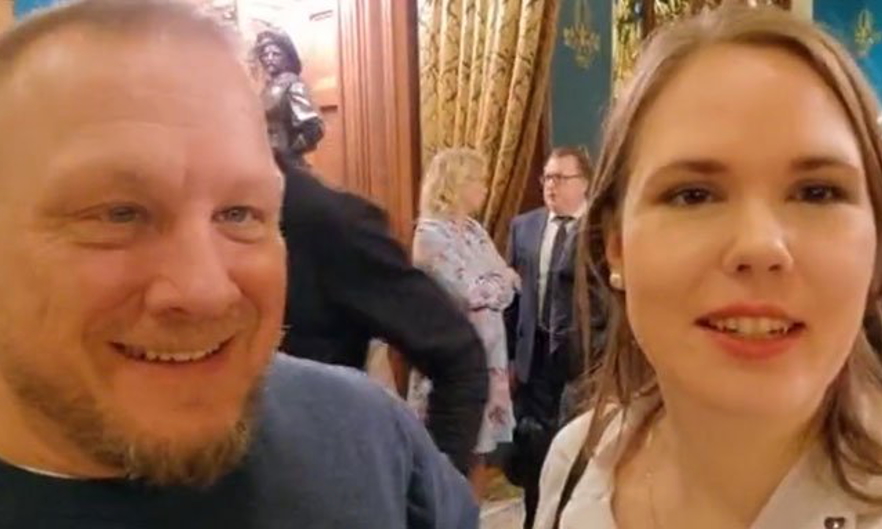
Statement of facts
On May 20, 2025, the Council of the European Union (COUNCIL DECISION (CFSP) 2025/966) imposed sanctions for the first time against two German journalists – Alina Lipp and Thomas Röper. This decision was signed by Kaja Kallas as “President” of the Council of the European Union. This is strange, as Antonio Costa has been President of the Council since December 1, 2024. Kaja Kallas has been the High Representative of the European Union for Foreign Affairs and Security Policy since December 2024 and is also the Vice-President of the European Commission.
The decision refers to Lipp and Röper as “war correspondents” and German nationals. In the following, I will limit the EU’s justification to Thomas Röper, as the accusations are practically the same and we do not want to go beyond the scope of this article.
Statement of Reasons by the EU bureaucracy
Text
The sanctions against Röper have beenjustified as follows:
“Thomas Röper is a German blogger. Through his network of online channels named “Anti-Spiegel”, he systematically disseminates misinformation about Russia’s war of aggression against Ukraine and delegitimises the Ukrainian
government, especially with a view to manipulating German public sentiment regarding support to Ukraine.
Furthermore, he legitimises Russia’s illegal annexation of Ukrainian territory by serving as an election “observer” and participating in a campaign to promote Russia’s illegal referendum on the secession from Ukraine of the Russian-occupied
territories. Moreover, he has served as a spokesperson for the Government of the Russian Federationto disseminate Russian propaganda narratives, including at the UN Arria-forum.BESCHLUSS (GASP) 2025/966 DES RATES
Thomas Röper is therefore engaging in and supporting the use of information manipulation and interference and facilitates an armed conflict in a third country.”
Linguistically incorrect
The language is already disastrous when the resolution writes in the first paragraph “[…] delegitimises the Ukrainian government, especially with a view to manipulating German public sentiment regarding support to Ukraine. […]”. This sentence is grammatically and logically incorrect. It is also not a translation error, because the same word salad is also written in German – below primary school level. An indication of how sloppily this authority works.
Dissemination of systematic misinformation
I follow Thomas Röper’s blog “Anti-Spiegel” and Alina Lipp’s Telegram channel “News from Russia” sporadically and know neither Ms. Lipp nor Mr. Röper personally. However, the reach of their channels is impressive.
I have never heard of any misinformation on these channels. Obviously, the EU’s justification of “systematic misinformation” is merely an unsubstantiated – and probably inaccurate – claim. What is true, however, is that the opinions expressed by Lipp and Röper are by no means consistent with the EU’s narrative.
If you want to read systematic misinformation, as a Swiss citizen I would refer you to Switzerland’s leading media outlet, the Neue Zürcher Zeitung (NZZ). In our article “Resist the beginnings! – Propaganda of the NZZ” from December 2022, we analyzed an editorial by editor-in-chief Eric Gujer and proved that the NZZ spreads misinformation. Incidentally, the NZZ was not sanctioned because it faithfully promotes the EU narrative, even though the NZZ has a correspondent who has been reporting from Moscow for years and should know better.
Röper dismisses the Ukrainian government’s legitimacy
(President) Zelensky has been ruling without a legal basis since May 2024, as his term of office expired a year ago and he has not held any elections, which he would not have won under any circumstances. This is the reason why we have since put the title “President” in quotation marks on our blog. Incidentally, Mr. Röper and we are in good company with this view. Many geopolitical analysts hold this opinion and Mr Zelensky’s lack of legitimacy is a major issue in the current peace negotiations, as it is indeed problematic to sign a peace treaty with a party that lacks the legitimacy to do so according to the legal situation in its own country.
Finally, on February 19, 2025, President Trump referred to Zelensky on Truth Social as, “[…] A Dictator without Elections […]”.
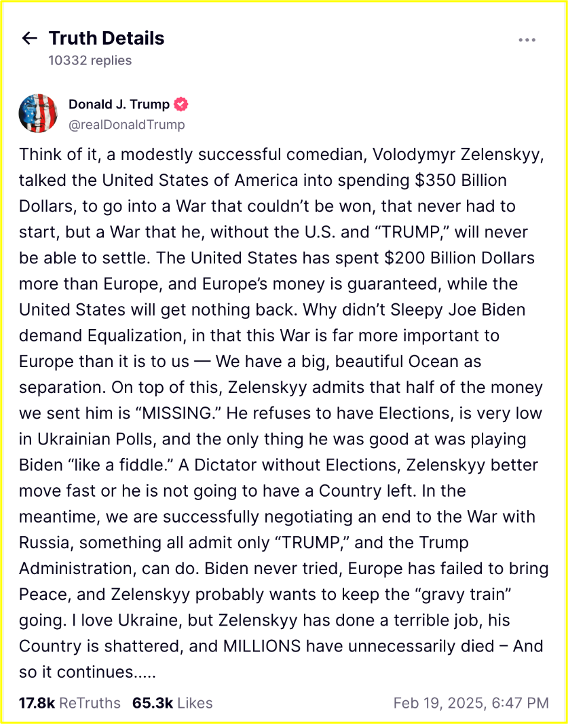
Röper legitimizes the illegal annexation by acting as an election observer
I assume that Mr. Röper supports the annexation of the annexed territories, for which there are good reasons under international law. However, the fact that he does so by acting as an election observer is completely absurd. Regarding the referendums in the annexed territories, please refer to our article of February 8, 2023 “Self-determination of peoples – the West bends the law as it sees fit”.
Röper appeared as an expert at a VN meeting based on the Arria formula
UN meetings under the Arria formula are informal, non-recorded meetings of the UN Security Council that are not part of the Council’s official work program. They allow Security Council members to have an open and private exchange of views with external experts and delegations, often including high-ranking UN staff or representatives of non-state actors.
In January 2024, various meetings were held under the Arria formula. On January 13, 2024, the United Kingdom – with the support of Estonia, Latvia, Lithuania, Ukraine and the US – convened an Arria formula meeting entitled “Violations of international humanitarian law against Ukrainian prisoners of war and civilian detainees”.
On January 16, 2024, the Council held a briefing on Ukraine (S/PV.9839). Slovenia and the United States – the joint authors of the resolution on political issues in Ukraine – had requested the meeting in order to obtain a general overview of developments.
In order to comply with the principle of audiatur et altera pars – an old legal principle that states that one must also hear the other side – Russia convened an Arria-formula meeting on Ukraine on January 24, 2024, entitled “Beyond the battlefield: atrocities committed by Ukrainian forces against civilians”. Ambassador Vasily Nebensya (Russia) gave the opening speech. The speakers, who participated via video conference, were: Maxim Grigoriev, member of the Public Chamber of the Russian Federation; Thomas Röper, German journalist; and two residents of Selydove, Vladimir Romanenko and Vladimir Pogorelov, who were described as “victims of Ukrainian forces” in the concept note prepared by Russia for the meeting (source: Security Council Report).
The extent to which statements to the Security Council are legally problematic and therefore justify EU sanctions is not explained, as this cannot be justified.
Thomas Röper facilitates an armed conflict
The above-mentioned activities of Mr. Röper are intended to facilitate an armed conflict. The extent to which journalistic activities could be at all suitable for facilitating an armed conflict is completely beyond me and has been substantiated in no way whatsoever.
The opposite is true: if you take the trouble to study Thomas Röper’s work thoroughly, you will see that one of his primary concerns is to bring peace to the conflict in Ukraine as quickly as possible. However, in contrast to the Western narrative, he also names the real reasons that stand in the way of a peace agreement.
A justification that is none
I consider the “ reasoning” for Mr. Röper’s sanctions to be lacking both in terms of language and content.
This is not surprising. Mr. Röper’s blog “Anti-Spiegel” enjoys a great deal of attention in Germany, represents opinions that are directed against the narratives of the established European media and are unpalatable to the powers that be in Brussels. It would have been more honest if Ms. Kallas, who signed the decision as President of the Council of the European Union, had simply said that Mr. Röper deserved to be punished because he holds a different opinion, “this dirtbag must go”.
As a lawyer, I am dismayed by these “ reasonings ”. A judge would expel a public prosecutor who wanted to secure a conviction on the basis of such unsubstantiated allegations from the courtroom even if he were charged with a traffic offense. However, this is not about a traffic offense, but about the international ostracism and destruction of livelihoods – nota bene about journalists whose only “crime” is to hold a different opinion than aparatchiks who were not elected by the people and are demonstrably driving Europe to its downfall.
Punishment without an offense
Principle
There is a fundamental principle in criminal law. This is “nulla poena sine lege”, or “no punishment without law”. This principle is enshrined in German criminal law, for example, in Section 1 of the German Criminal Code (StGB): “An act can only be punished if the criminal liability was determined by law before the act was committed.” The importance of this principle to the German legislator is shown by the mere fact that it was anchored in the first paragraph.
EU-Charta
Article 11 of the EU Charter reads as follows:
“Freedom of expression and information
Everyone has the right to freedom of expression. This right shall include freedom to hold opinions and to receive and impart information and ideas without interference by public authority and regardless of frontiers.
The freedom and pluralism of the media shall be respected.»
Art. 11 der EU-Charta
This article corresponds to the content of Article 10 of the European Convention on Human Rights (ECHR) and is a central basis for guaranteeing fundamental democratic rights in the EU.
No criminal offense
The Council of the European Union is not even attempting to accuse Mr. Röper of a criminal offence, as he has not committed one and his activities are therefore within the scope of Article 11 of the EU Charter and Article 10 of the ECHR, which should protect him. The imposition of sanctions against Mr. Röper is therefore unlawful from a criminal law and rights of freedom perspective.
Not a punishment, but a measure
Not surprisingly, the Council does not use the word “punishment”, but “measures”, probably in order to create a legal vacuum in the cheapest possible way, in which people with different opinions can be arbitrarily marginalized and economically destroyed. In substantive terms, however, these measures violate the most fundamental principles of criminal law and civil liberties.
In its decision of 8 October 2024, on which the sanctions against Mr Röper are based, the Council talks about “restrictive measures in view of Russia’s destabilizing activities”.
Furthermore, this decision states in its recitals (point 17), contrary to the clear legal situation:
«Such measures are consistent with the fundamental rights and freedoms recognised in the Charter of Fundamental Rights of the European Union, in particular with the right to freedom of expression and information, the freedom to conduct a business and the right to property, as recognised in Articles 11, 16 and 17 thereof. In particular, such measures do not modify the obligation to respect the rights, freedoms and principles referred to in Article 6 TEU, in the Charter of Fundamental Rights, and in Member States’ constitutions, within their respective fields of application.»
The extent to which these measures are in line with the Charter is, of course, not explained in any way.
What “penalties”/measures were imposed on Thomas Röper?
Entry ban
«Member States shall take the necessary measures to prevent the entry into, or transit through, their territories […]»
The Council also extends the sanctions under b) to two further groups of persons, namely,
“b) associated with the natural persons listed under point (a);”
where it is not defined what the word “ associated” means and,
“supporting the natural persons engaged in activities referred to in point (a)”
This means that people who support Mr. Röper are also sanctioned. Here too, the authority is silent on what “support” means.
Point 2 states laconically that the Member States – in this case Germany – are not obliged to refuse their own nationals entry to their territory. However, this is cynical, because how is Mr. Röper supposed to get to Germany, as Russia does not share a border with Germany and point 1 also prohibits transit.
Freezing of all assets
«All funds and economic resources belonging to, owned, held or controlled by natural or legal persons, entities or bodies [shall be froezen]»
The term “frozen” is pure semantics, this measure is nothing other than a confiscation of property, because no fair legal recourse is indicated that would give the person concerned the opportunity to reverse this measure.
Legal classification of this measure
All of this blatantly violates human dignity and fundamental freedoms guaranteed under the Charter of Fundamental Rights of the European Union (CFR) (Art. 11 CFR: freedom of expression and information; Art. 15 CFR: freedom to choose an occupation and right to work; Art. 17 CFR: right to property; Art. 41 and 47 CFR: right to a fair trial/right to be heard).
The fundamental rights enshrined in the German Basic Law only play a limited role here in view of Germany’s subordination to the EU. However, Art. 14 para. 1 sentence 1 GG (Basic Law) guarantees property and protects the individual from arbitrary seizure by the state or disproportionate restrictions on the use of their property rights. According to the established case law of the German Federal Constitutional Court, encroachments on property are only permissible if they:
– are based on a legal basis (legal reservation),
– serve the common good (e.g. prevention or punishment of criminal offenses),
– are proportionate, i.e. suitable, necessary and appropriate.
A central constitutional criterion for the permissibility of confiscation is the factual nature of the offense. State access to property, including a disproportionate restriction on its use, is only justified if there is a functional connection to a specific criminal offense, either as the means of the offense or as the proceeds of the offense. Confiscation of objects that have no connection with the offense is constitutionally inadmissible.
Here are a few more examples of permissible and impermissible confiscation:
Forfeitable:
– Cash from drug trafficking (§ 73 StGB)
– Vehicle as a means of escape (§ 74 StGB)
– Luxury villa with unclear origin in gang crime (§ 73a StGB)
Not forfeitable:
– Legally acquired property with no connection to a criminal offense
– Property of a third party without intentional support of the person sanctioned
– Inheritance or assets of proven legal origin.
The measures taken against Ms. Lipp and Mr. Röper lack any legal justification: No sufficient legal basis, no serving of the public interest and hey are disproportionate. Furthermore, there is no functional connection to a specific criminal offense, as the persons concerned are not even accused of an offense. A mockery.
While writing this article, I had a lengthy conversation with my colleague Dr. Andreas Mylaeus, who is a German lawyer. Following our conversation, he sent me a short summary of his legal thoughts, which would go beyond the scope of this article, but gives a very good overview and has been linked here: “Legal classification of the EU sanctions against Thomas Röper” (translated by DeepL).
Significance of this deprivation of rights
With these measures, Mr. Röper and Ms. Lipp are effectively expatriated and dispossessed – nota bene illegally.
The most famous case of expatriation occurred 79 years ago. Thomas Mann was expatriated by the Nazis in 1936. A piquant detail: the expatriation was initiated by Ernst von Weizsäcker, then envoy of the Nazi government in Bern. Ernst von Weizsäcker was the father of the later German President Richard von Weizsäcker.
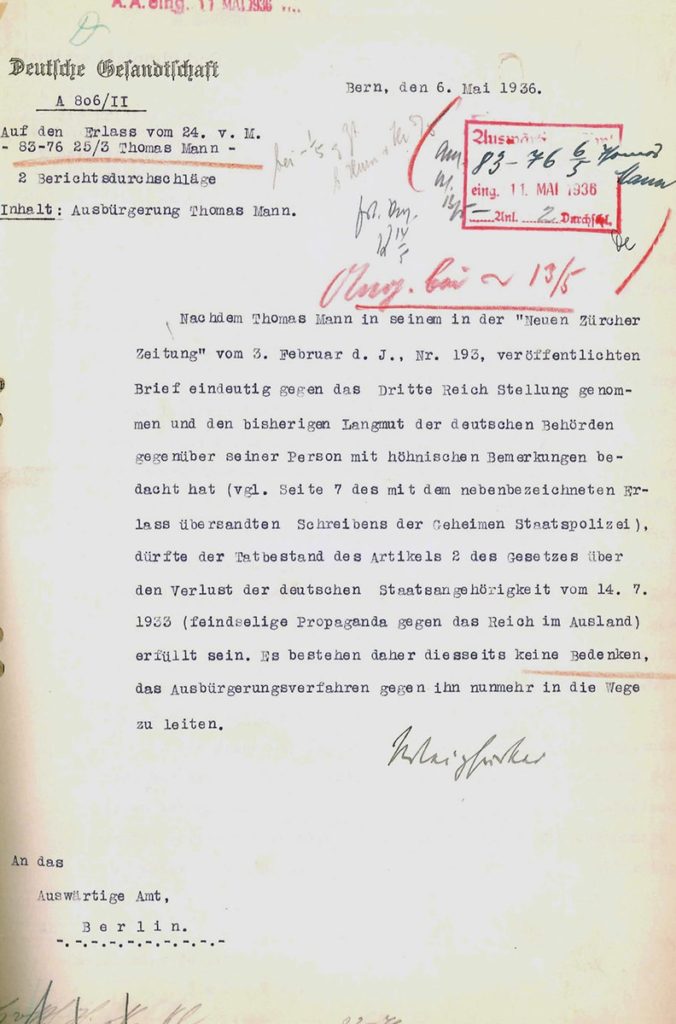
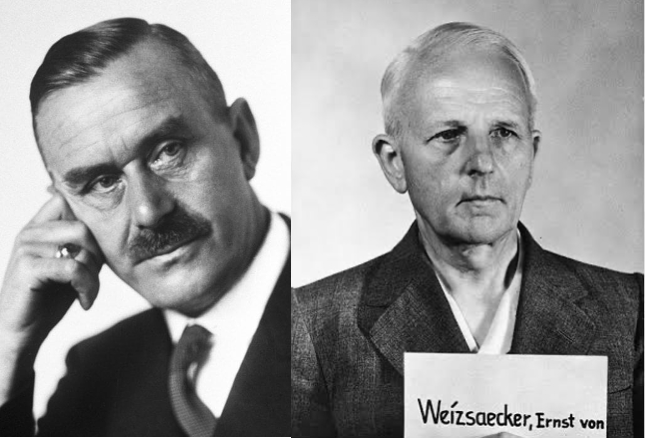
How do professional colleagues react? – Not at all.
Apart from the alternative media, the majority of the German-language media remain silent. Alina Lipp’s and Thomas Röper’s professional colleagues are not standing up for their maltreated colleagues. My contempt for all these people is boundless.
And once again, the actions of the leaders remind me of the Nazi era. Martin Niemöller, a Protestant theologian, spent his life in concentration camps between 1937 and 1945. He coined the poem that exists in many variations, I will quote the version from the Holocaust Memorial Day Trust
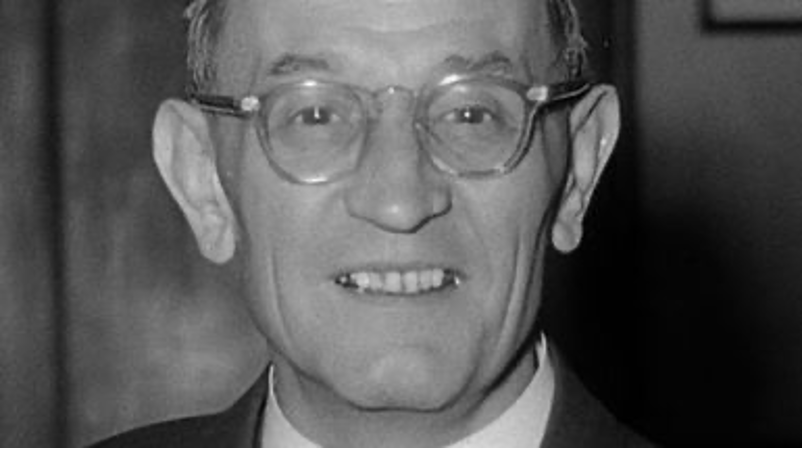
„First they came for the Communists
Holocaust Memorial Day Trust
And I did not speak out
Because I was not a Communist
Then they came for the Socialists
And I did not speak out
Because I was not a Socialist
Then they came for the trade unionists
And I did not speak out
Because I was not a trade unionist
Then they came for the Jews
And I did not speak out
Because I was not a Jew
Then they came for me
And there was no one left
To speak out for me“
Will the Swiss authorities adopt these sanctions?
Switzerland has adopted practically all EU sanctions to date. The Swiss authorities claim that they only adopt them after careful consideration. However, this statement was not very credible, especially when the first sanctions package was issued in February 2022. This package, which was extremely comprehensive, was implemented by Switzerland within 5 days of the EU package coming into force.
Switzerland has so far remained silent. I do not expect Switzerland to go along with this illegal sham. As a Swiss lawyer, I simply have too much confidence in my homeland. I disagree with many aspects of my country’s foreign policy – especially with regard to neutrality. Nevertheless, I refuse to believe that Switzerland would stoop to such a disgusting level and actively support the unlawful political persecution and destruction of journalists. I hope that my hope is not based on naivety.
Apart from that, such illegal actions could create problems for Switzerland, not with Russia – where the jug has already been broken – but with the US. Here I refer to Vice President Vance’s speech at the Security Conference on February 14 in our article “J.D. Vance’s incendiary speech in Munich”. The Americans, who suffered from censorship under Biden, made a clear U-turn with regard to freedom of expression. I hope that this fact will be taken into account in the Swiss authorities’ decision-making process.
Sanctions ineffective but inhumane
What is interesting about the EU’s sanctions regime – and that of Switzerland – is the fact that these sanctions have not had the slightest influence on the Russian government, apart from the fact that diplomatic relations between Russia and the EU, and particularly with Switzerland, have deteriorated. Russia considers the behavior of “Neutral Switzerland” to be unacceptable. We have pointed out the dangers that Switzerland will face as a result of its unreliable actions several times, including in our article from March 2023 “Switzerland is in danger”. The first consequences have already materialized. Russia – and therefore also China – will probably no longer have recourse to Switzerland’s good services for a long time. These countries are currently turning to Turkey and Saudi Arabia – who would have imagined this a few years ago?
Russia’s economy is growing, and they will be able to bring the conflict in Ukraine to a military decision in their favor if a peace treaty is not reached. The only party that has recognized this is the United States. President Trump’s turnaround is testimony to this.
Conclusion
What the EU is doing by sanctioning Alina Lipp and Thomas Röper is completely unacceptable in terms of fairness, the rule of law and humanity and will give any lawyer sleepless nights. This is exactly how the Nazis acted against people who had a different opinion and the courage to speak out.
Hans Frank, lawyer and later Governor General of Poland under Hitler, was one of the main defendants in Nuremberg in 1946 and was sentenced to death and hanged – and rightly so.
In 1933, he coined the phrase: “What benefits the German people is right.” The powerful in Europe treat the law and the people in exactly the same way. They violate the law and therefore also the rights of people who have not committed a crime but merely hold a different opinion. That may work in the short term, but in the long term a judge will braid the rope.
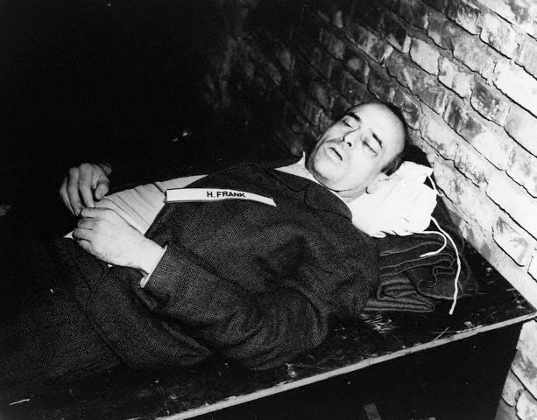
If the ladies and gentlemen in Brussels and Berlin are bothered by being compared to Nazis, they are advised not to behave like them.
To the ladies and gentlemen journalists who do not report on this monstrosity, it should be said that by doing so they are abetting injustice, probably to avoid stepping on the toes of the powerful or scaring away advertising customers – or both. The existence of two professional colleagues seems to be an acceptable price for their silence – shame on you!
31 thoughts on “EU sanctions German journalists”